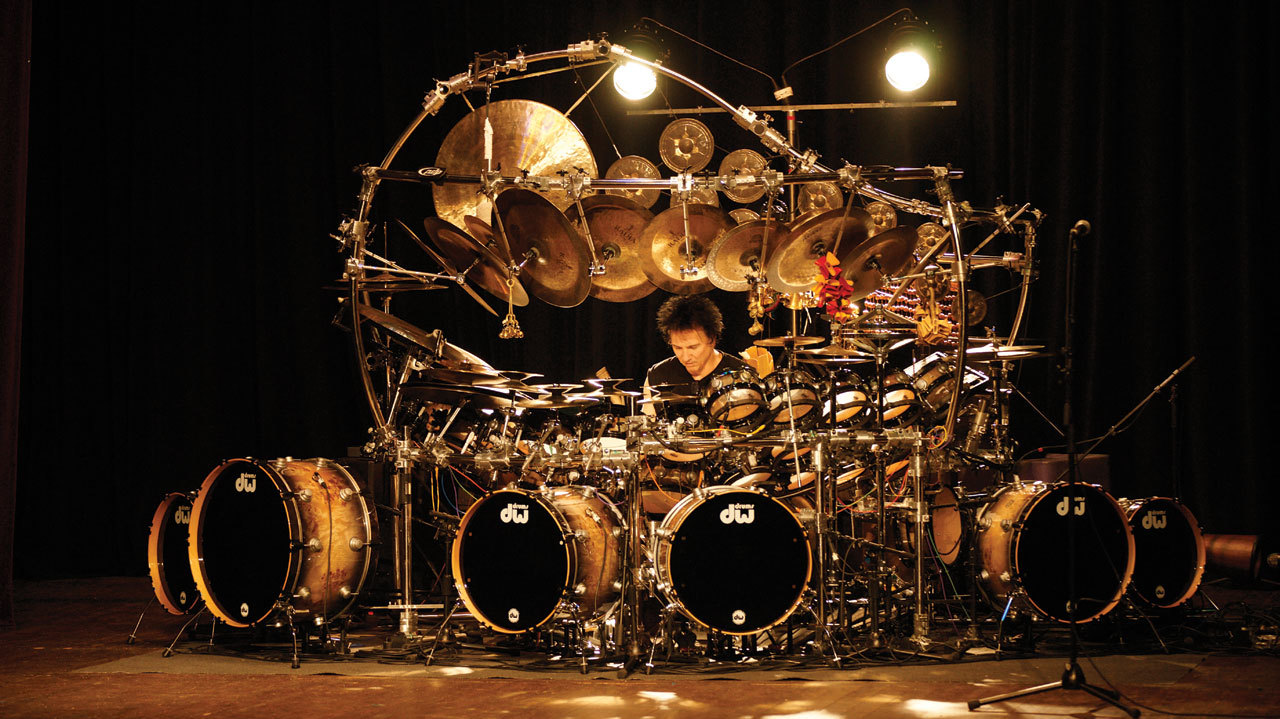Terry Bozzio isn’t someone known for sitting back and taking things easy. The Grammy Award-winning drummer who came to prominence with Frank Zappa albums such as Zoot Allures and Sheik Yerbouti in the 1970s is a self-confessed workaholic, never happier than when he’s embarking on one project or another.
Aside from Zappa, Bozzio’s turbo-charged drumming helped propel UK’s Danger Money and Night After Night after Bill Bruford and Allan Holdsworth left the ranks. Boasting stints with Jeff Beck, Quincy Jones and Mick Jagger, Bozzio has also fronted his own bands, including his post-punk synth-tinged pop outfit, Missing Persons, and the eclectic improv-supergroup HoBoLeMa, with Holdsworth and King Crimson’s Tony Levin and Pat Mastelotto.
Encouraged by Zappa and famed musicologist Nicolas Slonimsky, he developed a taste for composing settings that took him beyond rock and jazz, resulting in his contemporary classical chamber works performed by the Metropole Orchestra in 2003
Even when he’s not up to his neck in some aspect of music production, he’s an avid painter. Inspired by Don Van Vliet’s habit of carrying marker pens and paper, it was Captain Beefheart himself who suggested Bozzio develop his artistic side when the pair toured together in Zappa’s band. Bozzio’s abstract canvases have become collectible in recent years. All of his interests in music and art are combined with the release of Composer Series, a four CD and Blu-ray box set containing 59 individual compositions with a painting for each title, along with Terry’s detailed commentary in the accompanying notes. “I just try and do what I do. I sit down and chip away at it,” he says of his above average work ethic.
Dividing his time between his homes in the USA and Japan, at any one time his hectic schedule might include presenting drum clinics, performing solo concerts behind his vast, sculptural-looking 111-piece drum kit, working on numerous tuition videos, recording albums and, of course, doing interviews. When Prog speaks to Terry at his home in Southern California, we enquire, only half-jokingly, how he manages to stay alert and on-track with it all? “Coffee, Ritalin, nicotine!” he quips as he settles down to talk about his life and work.
Given the complexity of The Big Kit, with its hundreds of individual drums, cymbals, mallet instruments and so on, it seems safe to assume you’re a details kind of guy?
I spend more time under the hood with that thing, building and tweaking it, than I do actually playing and practising it, because if these little things aren’t right then I’m distracted from this creative flow. You have to get all those little things right.
How long does it take to set up ?
Now it’s got a MIDI set-up, micing and my own sound system on stage, so it’s gone up to about four hours comfortably. We could get it up in two at a push. The best it’s ever been put up in with soundcheck and everything was 45 minutes, a real record with a bunch of people who knew my kit helping out.
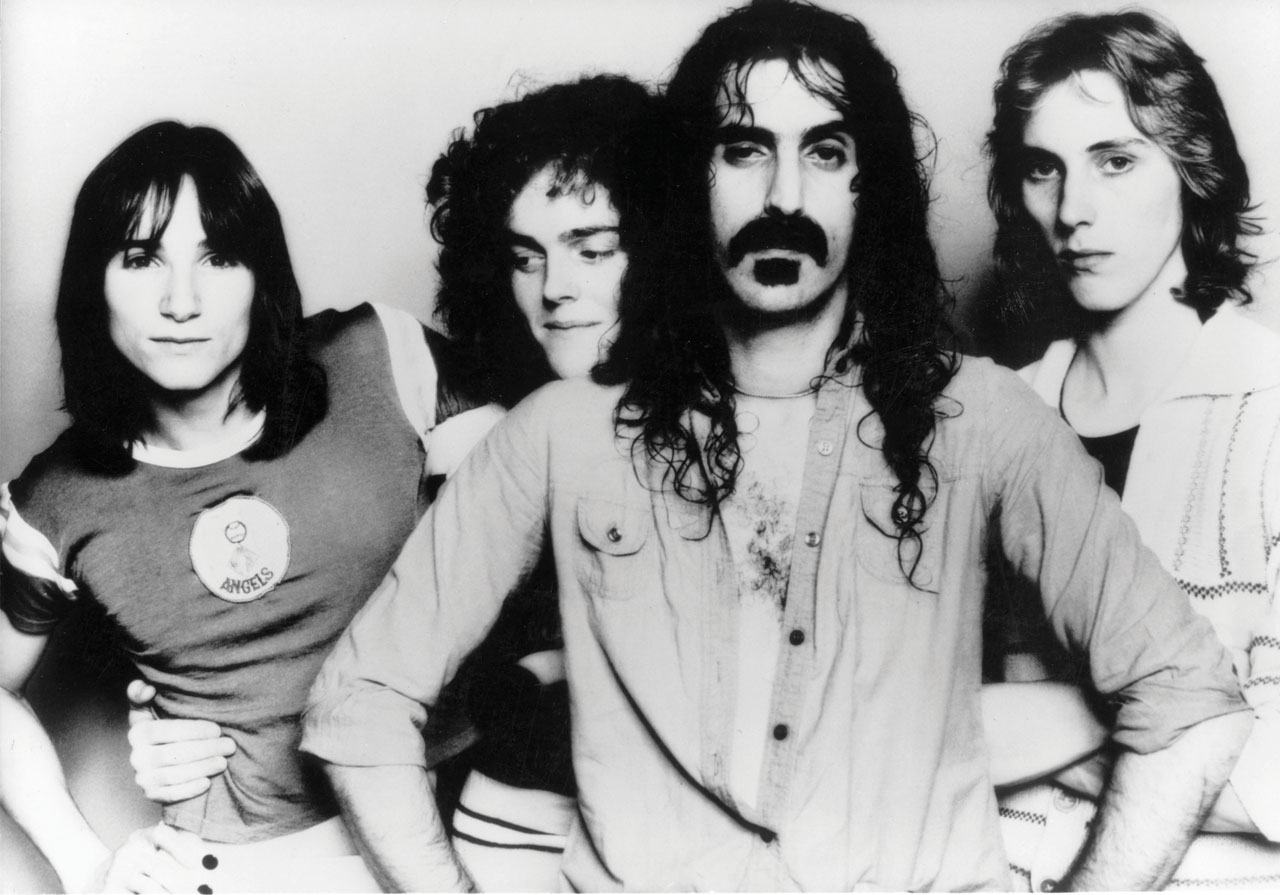
There’s definitely a sculptural aesthetic going on with it. Where did the idea for it come from?
The first rack I made was like a cage and I was looking at it and thinking, “Why am I putting these beautiful round drums and cymbals in this square cage?” So I made the rack curved and more sculptural and followed the form of the instruments, how they graduated from high to low, large to small. Now, I sometimes build these racks and I don’t even want to put drums on them, they’re so beautiful as a sculpture [laughs]. There’s a quote by Neil Peart about when he sat down at my drumset at Drumchannel at the DW factory. He looked around and he said, “Wow, this is his mind. This is his mind in drums!”
In your solo work there’s something almost ceremonial about what you do. Is the look of the thing as important as the sound?
Yes. Every detail is important. In a live performance you see with eyes as well as your ears. You listen on many levels: intellectual, physical, emotional and intuition. I think I’m more balanced sitting behind the drums in those four areas than anywhere else. The fifth element is the divine, that Big Bang that animates this whole thing.
Some artists prefer to let their music speak for itself but with your latest release, Composer Series, you’ve written very precise notes on each track.
I can think back to things that inspired me, like The Rite Of Spring by Stravinsky. I loved that music and then I happened to read some liner notes that were on an album of it and I realised then it was a ballet, and there was choreography and a whole mythological storyline to it as well. There was all this depth there that I didn’t know about and reading all that enhanced the listening experience. Initially I was just happy listening but then there’s all these other levels going on which made a difference to how I heard it and helped me appreciate it even more.
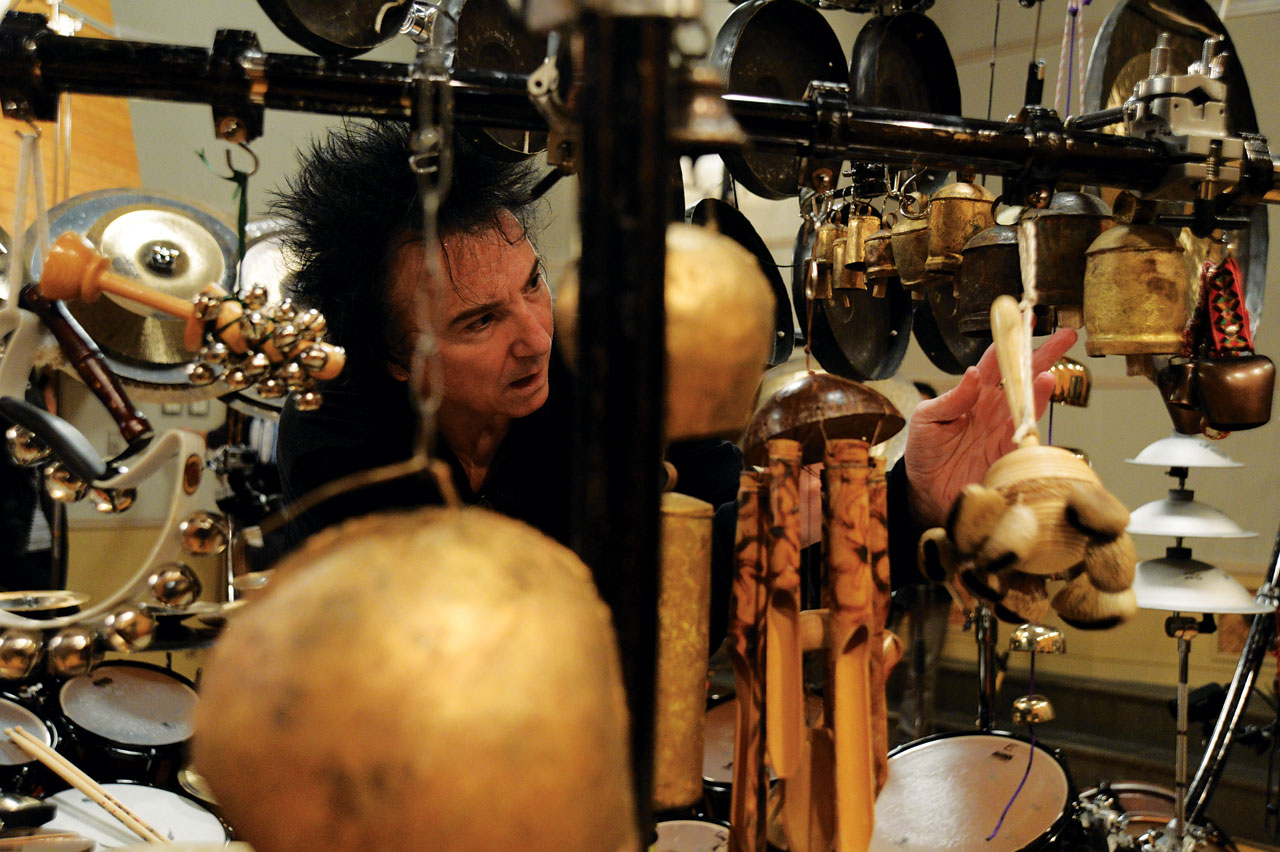
There are 59 tracks across four CDs which represent a large body of work. How far does this go back in terms of your writing?
I’ve composed for myself for the last 25 years and then before that, dabbled in it. It was always just there. So, some of the things on Composers Series go way back to the 70s or 80s.
What’s your approach when composing?
It’s like working a crossword puzzle: this has to work this way and that way, horizontally and vertically on a line of time. You follow where these things take you. I work intervallically with music so if there’s one note, I can hear where the next note should be and I go there. After a while of chipping away at it, day after day, you have this body of work. When I played with the Metropole Orchestra I remember talking to the bass clarinet player and talking to him about something and he says, ‘Did you really write all this stuff?’ And I told him: ‘One note at a time!’
To what extent are these kind of big projects about getting your life’s work in order?
I can die now! [Laughs] That’s happened to me almost every time I’ve done anything I’m happy with.
I meant is it important to pull together all these pieces into one place, a grand statement of sorts?
People know me as I played with this guy or that guy and they know my solo drum music but they don’t really know about this other side of me, the art and the compositions. So I wanted to share what my experiences are and approach is to each tune. I enjoy writing about the music and sharing my feelings and the technical aspects with others so they can learn or grow from it if they’re interested. Somehow this is the essence of us and what we need to do to find our own bliss, and having that wonderful feeling of knowing that I’ve created something that satisfies me. And if I can like it, as critical and as cynical as I am, then maybe others will like it too. And maybe not in my lifetime but it’s there. It really is that kind of feeling when you do something that you love and you finally got it out. Whether it sells or not doesn’t matter. You did it.
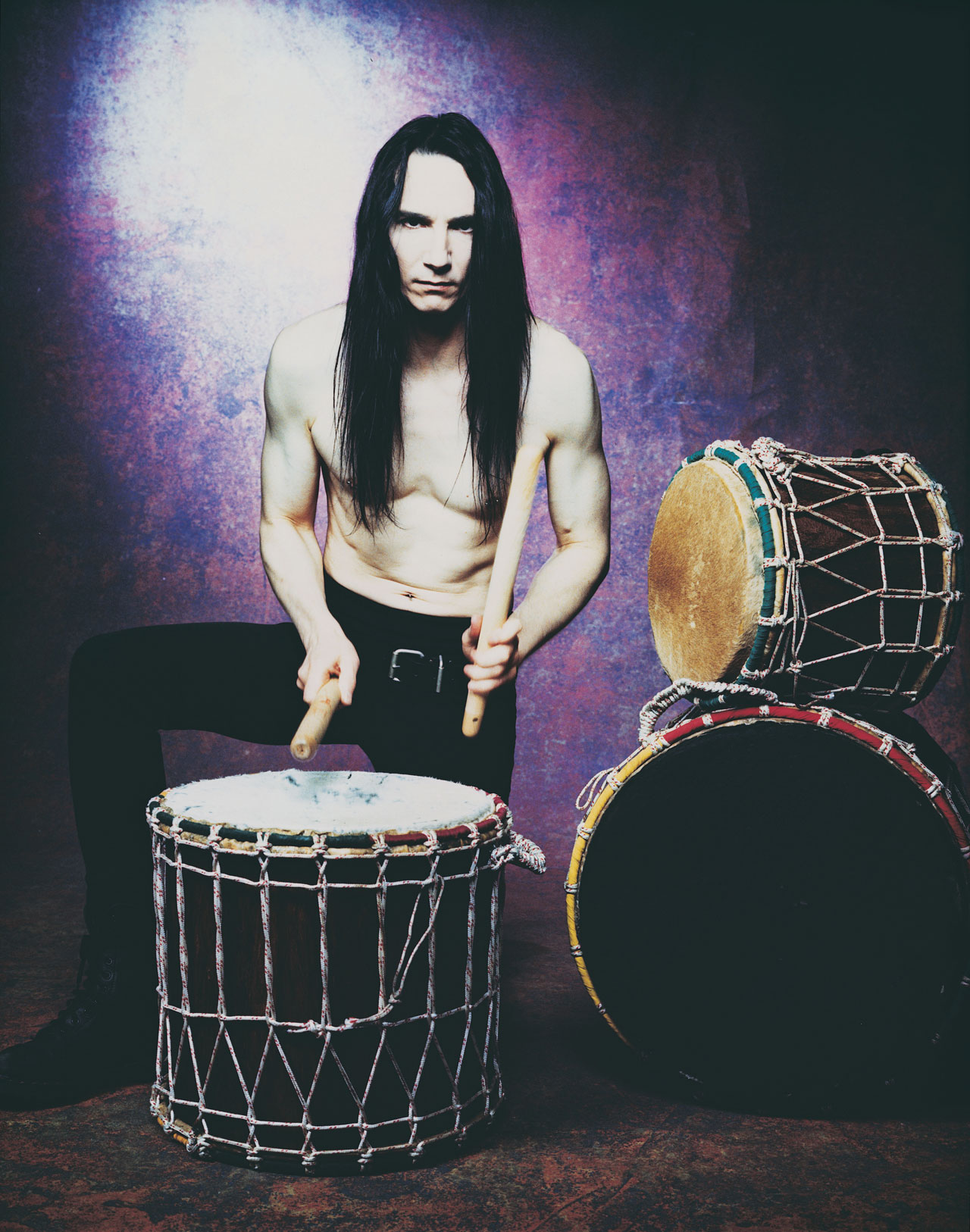
You’d had quite a lot of experience before auditioning for Frank Zappa. But was it still daunting?
It was amazing. I auditioned and he said he wanted to hear me after he’d heard the rest of the guys and nobody wanted to audition after me. So Frank turned to me and said, “It looks like you’ve got the gig if you want it.” My words were, “Are you sure I can do this?” [Laughs] He said “Do you want to do it?” and I said, “Yeah!” I wasn’t sure if I was heavy enough to work with his guys and he told me that if I was willing to work hard I could do it. So like a good father, he took me in.
What do you think is the most common misconception that people have about Frank Zappa?
I don’t know anything about brain surgery, right? I know about music, and when neurosurgeons start talking shop I’m lost. And I don’t really care. I care that they’re helping people and the result, but you know to really understand a musician or another human being, you’ve got to live it, be it and have something in common. I don’t think rock journalists have much in common with a guy like Frank. To me, he was a guy who probably had at least seven talents and he could’ve made a successful career out of any one of them but he had all seven. He was 10 years older than me and a real genius on all those levels. I came to him so naive. Every negative thing he said about the music business or politics I almost refused to believe because I couldn’t go there – I couldn’t lose hope, you know what I mean? But everything he said has come to pass. Everything he ever said, as cynical as it was, was true. He was really one of these guys who was like an arrow. He could cut through anything, get right to the heart of it and sum it up in the most succinct way.
How did you come to leave Zappa’s band?
I’d been playing with Patrick O’Hearn, Mark Isham and Pete Maunu as Group 87 and we’d been to audition for a deal at CBS. I was late for rehearsals with Frank because of it. Frank sensed what had happened that day. We get up and we started playing something and Frank felt that I didn’t have the heart for it anymore. He said, “Bozzio, step into my office”, and we went behind the little riser in the rehearsal studio and he said, “I think it’s time you go out and do your own thing.” And once again I said, “Are you sure I can do this?” [Laughs] Like a good father he kicked me out of the nest.
What’s the thing you regret the most about that period with Zappa?
That I didn’t ask questions. I didn’t want to show my ignorance. Many times he used words I didn’t understand and I’d just laugh because I didn’t want to appear stupid. I wish I’d asked what the words meant. Stuff like that. But I was young and just happy to be there, going through all the rock’n’roll, groupie bullshit. Nobody can tell you how to handle success. When it comes you’re on your own, man and you just get swept along with whatever’s happening. Later, you learn through experience, that this may not have been the best way to do this or that.
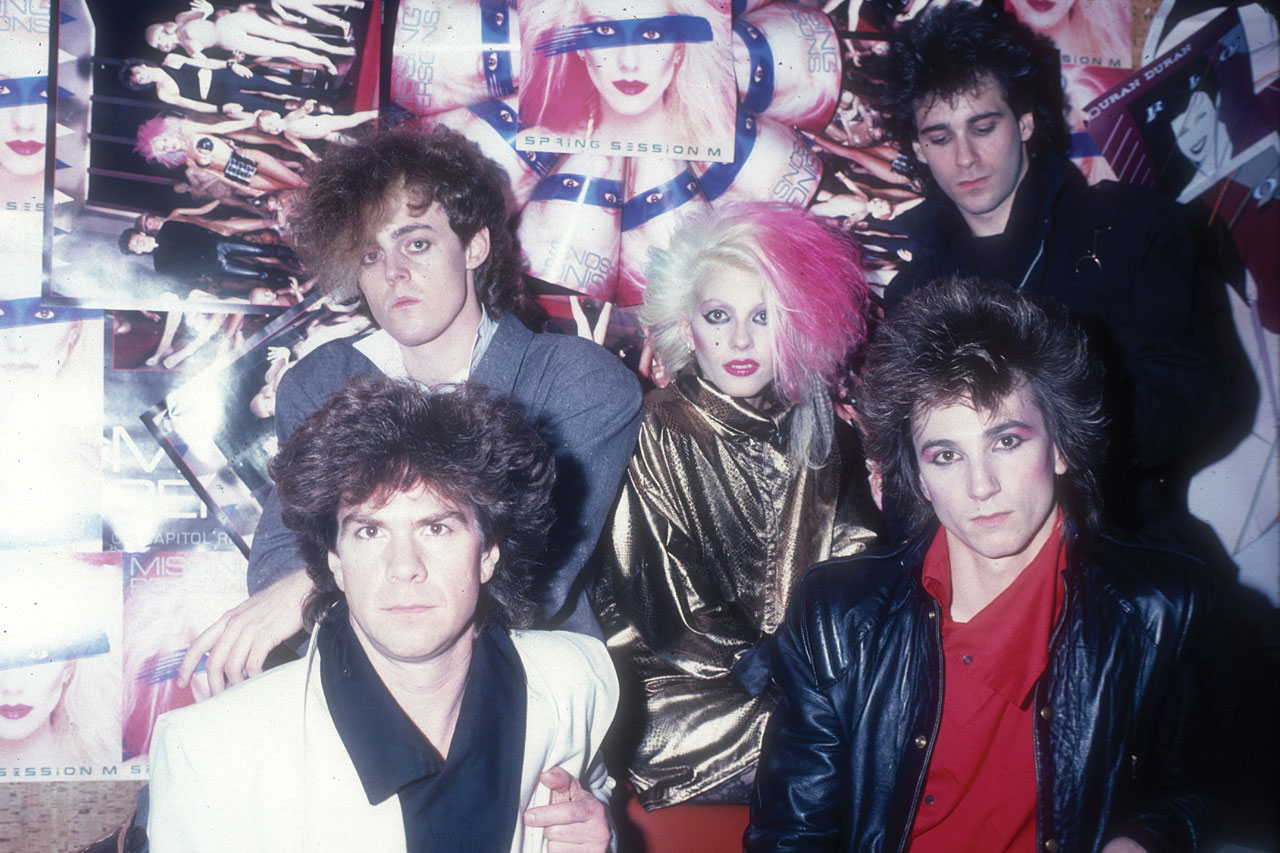
How would you describe the difference between Don Van Vliet in private and public, or where they both the same?
He was just out there, man. He was his own person. When I first met him I thought he was like an acid casualty from Frank’s past that I knew nothing about. And then I got to know him a little better and realised how deep he was. He loved some rough and dirty blues that not a lot of people know about, or rather, didn’t know about then.
The big revelation came when we were in Austin, Texas recording Bongo Fury. Frank asked me to come over to his room. He’d sent someone out to buy a portable record player and he put on Trout Mask Replica. I listened to this stuff and it was just out. I mean completely random noises happening that was unbelievably… out there. It didn’t seem organised in any way. Frank said, “You know they played this exactly the same way every time.” And then I went, “Oh my fucking god!” [Laughs] and then I began to realise that on a whole other level, Beefheart was just as deep as Frank, y’know? I think Frank told Don how shocked I was at his music – I’d never heard it and didn’t know anything about it – and Don and I became more friendly. I got into the drawing thing and he encouraged me and that was really sweet. He’d say, “I really like the freedom of what you’ve got going on here”, and it helped me move into more abstract areas.
He’s still regarded as something of an enigmatic figure, isn’t he?
As a person, you need a thesaurus of mythological and symbolic and maybe even jazz bebop terminology to even understand what he was saying. He spoke in symbols. And they were very idiosyncratic symbols. It was really a journey and adventure to be around the guy. One time, in my second year with Frank, Beefheart had finished his stint and was forming his own thing. Frank rented a suite at the Beverly Hilton hotel where there was a record company convention going on. He was trying to sell and do his deals. We got into the elevator. There was Patrick O’Hearn, who’s got an amazing sense of humour; myself; Frank, who is just on another level of being able to say something that’s really funny; Gail, his wife, who’s really smart and capable; and there’s Beefheart. We’re in this elevator and out comes Herb Alpert’s muzak version of A Taste Of Honey. The space in there was electric, everybody’s eyes were darting around, wondering who was going to say something first, whose gonna rip this music. Beefheart jumps in and says, “Y’know there’s only one kind of thing you can do with this music.” He snaps his fingers and shouts, “Dig it!” [Laughs].
You’ve revisited Frank’s music guesting with Zappa Plays Zappa, haven’t you?
Yeah. Dweezil is a saint. He’s playing stuff that Frank never dreamed would be played on the guitar. Mallets can pretty much play anything but guitar has restrictions and he plays the fast stuff like in Inca Roads. I mean Frank never played that stuff. He’d turn around and conduct, y’know? Dweezil is somebody I truly respect.
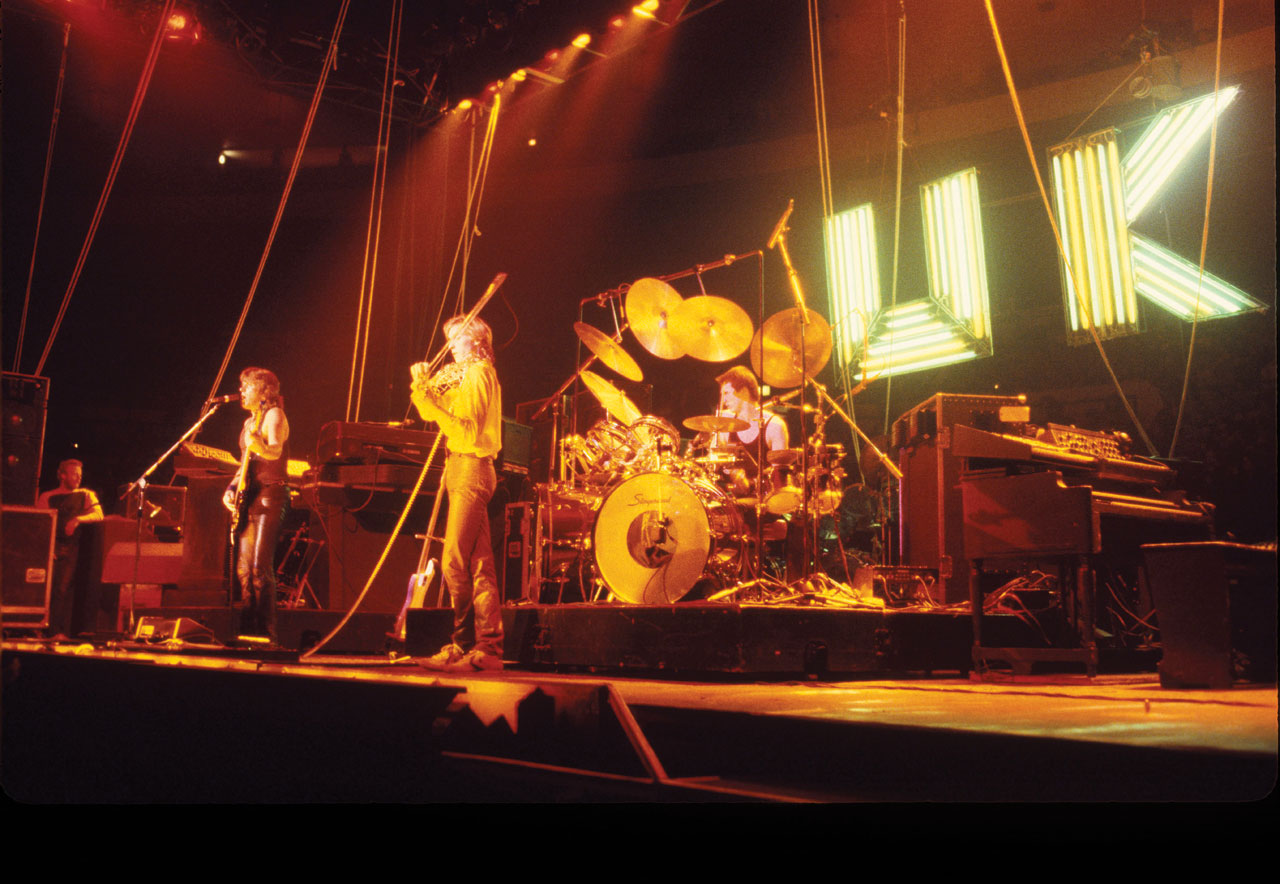
What was the transition from Frank Zappa to UK like?
It was painful. It was depressing. I did the Group 87 record but as a sideman. Looking at the record contract was really shocking and depressing. So, I decided not to sign the deal. A year later I think I had an audition for Thin Lizzy and that didn’t come together. I’m not a drink, fight and fuck kind of guy, you know? Gary Moore wanted me and we got on great, but the band was just a different thing and I was not in that same headspace as the rest of those guys. So it was the right thing.
Eddie Jobson talked to me about Bill [Bruford] and Allan [Holdsworth] wanting to be more jazz whereas John [Wetton] and he wanted to go more rock. So I started in UK in ’78. That was a tough transition. I was still just a sideman in UK. I didn’t want to sign another contract where the company owns everything into perpetuity. Eddie and John made all the decisions and there’s always that Upstairs, Downstairs thing when you deal with the English [laughs]. John is a dear friend – I text him almost every other day or so – but Eddie and I just cannot see eye to eye. He looks at it like a corporation and he’s the CEO and I don’t feel I’m respected as somebody who contributed to what they are, and even what they can be today. So that’s really the issue with Eddie. I have much respect for him as a composer and a musician but as people, we have two different ideas about how things should be.
Out of all your varied bands and projects over the years, what stands out for you?
I did a stint with Allan Holdsworth, Tony Levin and Pat Mastelotto in 2010 under the name HoBoLeMa. This was one of the best experiences I ever had. I regard that band as incredibly important. Allan was playing his ass off! He is a complete master of that instrument and has taken it places that nobody else has.
There were rumours of a live album. Why has that never materialised?
You know, Allan has issues with releasing recordings that aren’t perfect, so I don’t know if it’ll ever come out. But it’s some of the best stuff I ever got to do and one of the most wonderful feeling band experiments I’ve ever done!
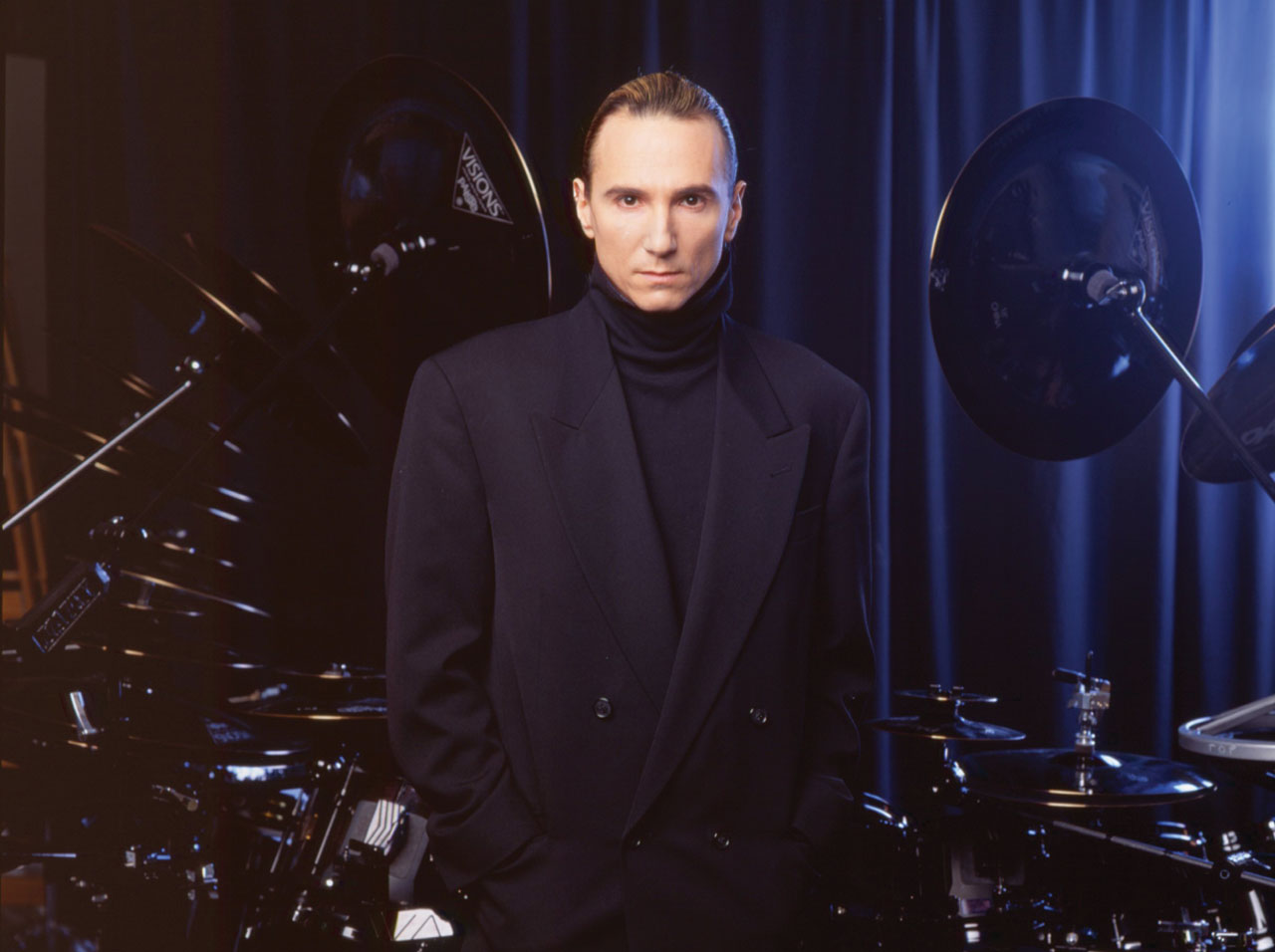
How important is connecting with an audience in those circumstances?
There’s something about recorded music, whether video or audio, that is nowhere near the magic that happens when real humans play music for other real humans in a room. Something is transcendent there. It just can’t be duplicated.
What’s the best advice you’ve received?
One time I met drummer Louis Bellson and he sat down and said, ‘Don’t forget about notes and chords; study music; learn how to play the piano - it’s not just about drums.’ That stuck with me to this day.
It’s a tough environment for musicians to make a living. How do you stay optimistic?
With my work. I just released my music and my art on my website so now I can sell directly to the public. I’ve been very, very lucky and grateful to have had the life experience I’ve had. I’m 66 and I’ve never had to have a day job. I’ve been lucky to just survive and learn and try and grow from all the experiences I’ve had. I’m very blessed to have had many brushes with greatness.
The Terry Bozzio Composer Series box set is available now on Ward Records. See www.terrybozzio.com for more information.
